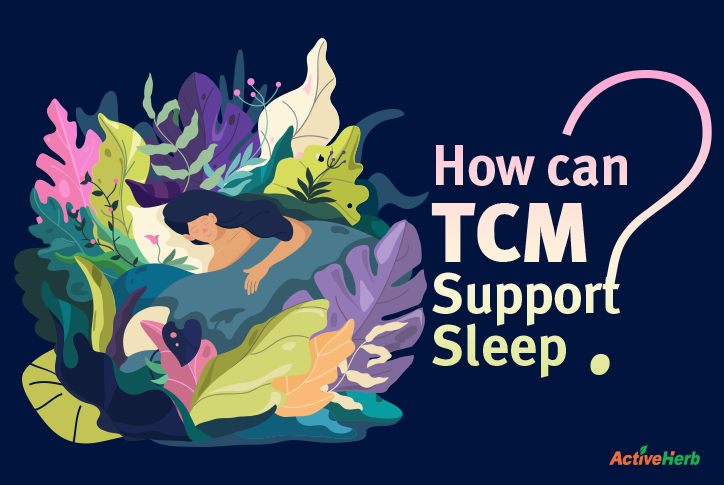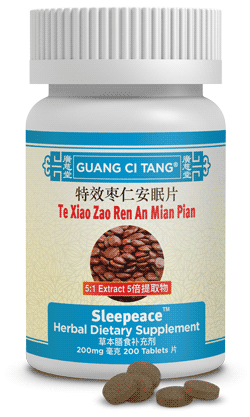How Does TCM Work To Support Sleep Quality?

Can plants support sleep quality—without causing dependence or losing their efficacy over time? For centuries, people have used herbal preparations for occasional sleeplessness. But how does herbal medicine used in traditional Chinese medicine (TCM) actually work?
We know thanks to modern research that certain molecules in plants act directly on receptor sites in the brain and neurotransmitters. Take for example, THC, the active ingredient in marijuana. The psychoactive molecule interacts with the a neuroreceptor (CB1) that’s a part of the endocannabinoid system, which was only recently discovered—in the early 1990s—and similar to TCM’s principle of perfect Yin/Yang balance, helps maintain homeostasis in the body.
But relying on THC for a good night’s sleep obviously can have some drawbacks, including actually contributing to sleeplessness in some people.
How Does TCM Support Sleep? Look To The Heart…
Cannabis is one of 50 fundamental herbs in TCM. But if you don’t want to get high, there are dozens of other classic Chinese herbs that support occasional sleeplessness. And one way in which classic Chinese herbs may support sleep is by influencing the endocannabinoid system. You can read more about this here at Just Kana.
Of course, no modern research studies definitively support this notion. However, if the endocannabinoid system of western medicine controls homeostasis, which in turn dictates sleep quality, we can look to TCM theory for parallels between Western and Oriental medicine.
From a TCM perspective with a modern twist, the endocannabinoid system’s TCM equivalent is the Heart organ system, which is the master control organ of all other organ systems.
So in order to support your body’s ability to get a good night’s sleep, TCM seeks to nourish Heart function.
When you think of the heart, is there anything else that comes to mind besides a muscle that pumps blood throughout the circulatory system? Well, in TCM theory, the Heart system does that too but also a lot more.
For example, the Heart houses the “Shen,” which can be loosely translated as “spirit.” Your every thought and your cognitive abilities are governed by Shen. During the day, Shen takes root in the Heart (and to a lesser extent, the Liver). By taking residence in the Heart, your Shen can guide you during the day through complex thought-making decisions.
However, if your endocannabinoid system is dysfunctional, your Heart will be unable to contain your Shen. Consequently, your Shen will sleepwalk its way to other organs such as the brain, causing an inability to sleep.
One way in which Chinese herbs such as Yuan Zhi (Polygala root) and Wu Wei Zi (Schisandra seed) support sleep is by calming the Heart system, thereby resolving a restless, wandering Shen.
How Do Chinese Herbs Work For Sleep?
Let’s bring back the endocannabinoid system to the discussion on sleep and TCM. On a basic level, TCM supports a normal sleep cycle by promoting Yin-Yang balance. If the Heart organ system is the master internal cannabinoid, then Yin and Yang balance functions as the overall endocannabinoid system. The endocannabinoid system of Western medicine is the prime influencer of homeostasis. And that’s precisely what Yin and Yang harmony is all about in TCM. The harmonious, balanced flow of Yin and Yang promotes vitality and optimal wellness.
But in addition to the Heart, imbalances in other organ systems can also cause sleep disturbances. For example, if you wake up during the night wide awake because of a dream, it could mean that there is dysfunction in your Spleen and/or Gallbladder. If it takes you forever to fall asleep, there may be imbalance in the Liver.
Every organ system in TCM has points along an energy superhighway called meridians or channels. TCM sleep-support herbs help clear obstructions in the meridians. The result is enhanced circulation and blood flow, improved digestion and a more placid Shen.
If you find yourself typically waking up in the middle of the night, you can use Chinese meridian clock theory to determine the root cause of your organ imbalance. The two organs most likely to affect your sleep cycle in the middle of the night are the Liver, which is most active from 1:00 to 3:00 a.m., and the Lungs, which according to TCM theory, are most active from 3:00 a.m. to 5:00 a.m.
TCM supports sleep by optimizing the function of these organs, and in general, by supporting overall Yin-Yang balance.
Conclusion
Perhaps one day, modern research will conduct robust studies on how specific Chinese herbs directly (or indirectly) activate signalling molecules that interact with the endocannabinoid system. Until then, we can support our sleep with time-tested TCM formulas.
Read More About TCM & Sleep:
Simple Solutions For A Sound Sleep — How TCM Can Help You Get Some ZZZ’s







